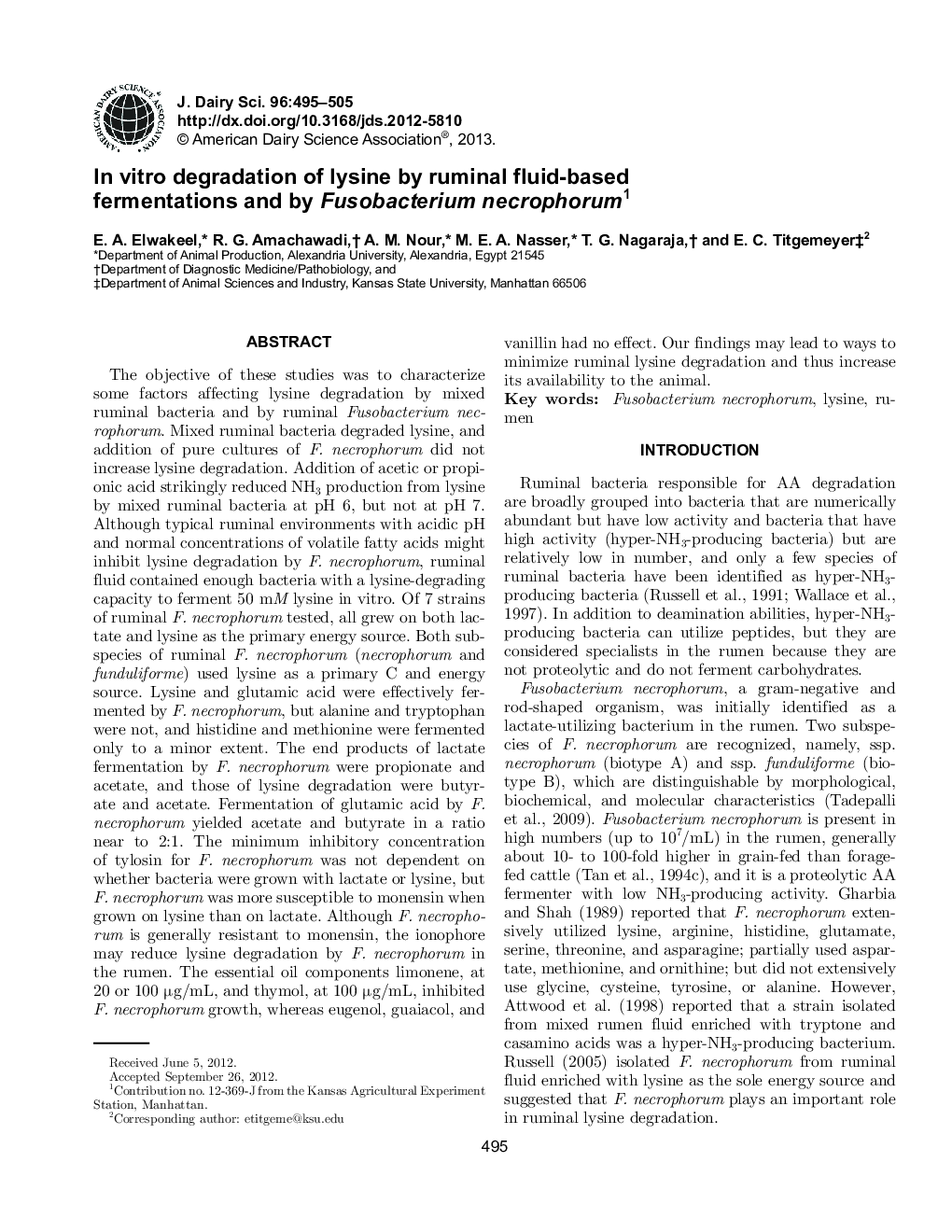| کد مقاله | کد نشریه | سال انتشار | مقاله انگلیسی | نسخه تمام متن |
|---|---|---|---|---|
| 10980606 | 1108071 | 2013 | 11 صفحه PDF | دانلود رایگان |
عنوان انگلیسی مقاله ISI
In vitro degradation of lysine by ruminal fluid-based fermentations and by Fusobacterium necrophorum
ترجمه فارسی عنوان
تخریب لیزین در شرایط آزمایشگاهی به وسیله تخمیر مشتقات شفاف و فوزوباکتریوم نکوفوروم
دانلود مقاله + سفارش ترجمه
دانلود مقاله ISI انگلیسی
رایگان برای ایرانیان
موضوعات مرتبط
علوم زیستی و بیوفناوری
علوم کشاورزی و بیولوژیک
علوم دامی و جانورشناسی
چکیده انگلیسی
The objective of these studies was to characterize some factors affecting lysine degradation by mixed ruminal bacteria and by ruminal Fusobacterium necrophorum. Mixed ruminal bacteria degraded lysine, and addition of pure cultures of F. necrophorum did not increase lysine degradation. Addition of acetic or propionic acid strikingly reduced NH3 production from lysine by mixed ruminal bacteria at pH 6, but not at pH 7. Although typical ruminal environments with acidic pH and normal concentrations of volatile fatty acids might inhibit lysine degradation by F. necrophorum, ruminal fluid contained enough bacteria with a lysine-degrading capacity to ferment 50 mM lysine in vitro. Of 7 strains of ruminal F. necrophorum tested, all grew on both lactate and lysine as the primary energy source. Both subspecies of ruminal F. necrophorum (necrophorum and funduliforme) used lysine as a primary C and energy source. Lysine and glutamic acid were effectively fermented by F. necrophorum, but alanine and tryptophan were not, and histidine and methionine were fermented only to a minor extent. The end products of lactate fermentation by F. necrophorum were propionate and acetate, and those of lysine degradation were butyrate and acetate. Fermentation of glutamic acid by F. necrophorum yielded acetate and butyrate in a ratio near to 2:1. The minimum inhibitory concentration of tylosin for F. necrophorum was not dependent on whether bacteria were grown with lactate or lysine, but F. necrophorum was more susceptible to monensin when grown on lysine than on lactate. Although F. necrophorum is generally resistant to monensin, the ionophore may reduce lysine degradation by F. necrophorum in the rumen. The essential oil components limonene, at 20 or 100 μg/mL, and thymol, at 100 μg/mL, inhibited F. necrophorum growth, whereas eugenol, guaiacol, and vanillin had no effect. Our findings may lead to ways to minimize ruminal lysine degradation and thus increase its availability to the animal.
ناشر
Database: Elsevier - ScienceDirect (ساینس دایرکت)
Journal: Journal of Dairy Science - Volume 96, Issue 1, January 2013, Pages 495-505
Journal: Journal of Dairy Science - Volume 96, Issue 1, January 2013, Pages 495-505
نویسندگان
E.A. Elwakeel, R.G. Amachawadi, A.M. Nour, M.E.A. Nasser, T.G. Nagaraja, E.C. Titgemeyer,
